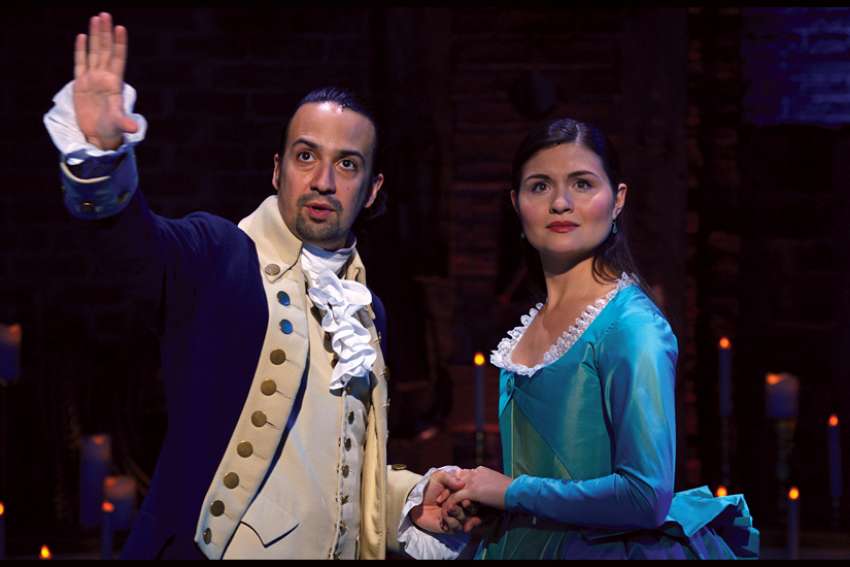So, are America’s Founding Fathers heroes or not? Hamilton, for the most part, seems to think so.
Tickets to the five-years-running, hip-hop-infused extravaganza had become impossible to acquire, but the pandemic shut down any hope of live performances. Thankfully, COVID-19 visited us in a digital age and the Disney+ channel streamed it for free over the Fourth of July weekend. (You can still stream it, but now it will cost you a full subscription. Or, you can wait for the DVD/Blu-ray slated for the fall.)
Based on a book by historian Ronald Chernow, creator/leading man/composer/lyricist Lin-Manuel Miranda was inspired by what he deems “an immigrant’s story” (Alexander Hamilton was born in St. Kitts). One of my favourite lines is when Hamilton and Marquis de LaFayette concur: “Immigrants. We get things done.”
Is Hamilton all it’s cracked up to be? Yes. It’s extremely “talkie,” at least at first, because there’s a boatload of history that must be exposited. Although the historical accuracy of Miranda’s work has been questioned, there is no denying the mammoth influence Hamilton had on the American Revolution, nation-building and formulating the young democracy.
Hamilton’s brilliant mind, his economic genius, his patriotism and statesmanship are all to be greatly admired. His personal flaws and failures (workaholism, infidelity, always needing to prove himself) are dealt with in a non-judgmental way. His long-suffering wife, Eliza, is given significant space to tell us her perspective. Without giving too much away, Eliza does not allow herself to be a doormat to Alexander, to fate, to politics, and does not sacrifice her own integrity. Whatever she does — whether forgiving, “erasing” herself “from the narrative” or writing herself back in — she freely chooses her course of action. Fittingly, in the play she is given the last word.
On a Theology of the Body note, Hamilton’s affair is no small thing. Hamilton appeals to God to strengthen him in the moment of temptation, but falls nevertheless. Not only was honour (the very reason Hamilton died in his prime) of supreme importance in the 18th century, so was morality.
What informs the values of “Hamilton’s” men and women? The Holy Bible is an unquestioned authority and reference point. It is appealed to and quoted frequently and naturally, as would have been done in those times. A musical number about the “ten commandments of a duel” (something we would say today) reminds us that even in our current age, our speech is embedded with the religious roots of Western Civilization.
This is an un-obnoxiously self-conscious story about storytelling. One of the songs is “Who Lives, Who Dies, Who Tells Your Story.” The characters are aware of the momentousness of the times they are living in and shaping with their every decision.
Wonderful themes are wonderfully repeated: Alexander is like his country — young, scrappy and hungry. Alexander won’t give away his shot at life. Alexander is never satisfied. At the height of tensions, the comedic Jefferson provides some relief with “What Did I Miss?” (having been away in France). The really big laughs are saved for King George himself. With just one condescending stare and a note or two of a Beatle-esque ditty, we are rolling in the virtual aisles.
Slavery is only lightly dealt with. Many Founding Fathers were slave owners (Washington is given a huge pass here and practically canonized on stage), but some FF’s wanted to include Emancipation in the goals of the Revolution. The musical numbers are fitting, clever and masterful, but I didn’t find them at all easy to remember or sing along with. Hip-hop takes talent!
In the midst of all this theatrical hubbub of ostentatious history-making, do not imagine that your emotions might be left intact. You will find yourself caring deeply about these giants’ intimate personal lives, families, relationships, cherished dreams — and they’re not so different from our own.
There’s nothing like being in a theatre with the impeccable live sound, lighting and pumping energy. However, watching it on the screen gives you incredible close-ups, camera angles and a ubiquitous “seat” that doesn’t even exist in reality.
I rate the award-showered Hamilton PG-13. It’s a worthy way for young people (and everyone else) to learn some — albeit highly dramatized — history that continues to impact the present. Like the men and women portrayed and the men and women portraying, Hamilton is an all-around class act.
(Sr. Burns, fsp, is a Daughter of St. Paul. She holds a Masters in Media Literacy Education and studied screenwriting at UCLA. Her website is HellBurns.com; Twitter: @srhelenaburns)


